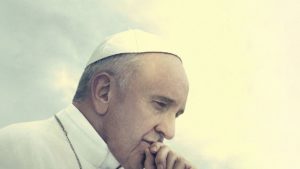Pope Francis — A Man of His Word
Posted on May 18, 2018 at 7:30 pm
B +| Lowest Recommended Age: | Middle School |
| MPAA Rating: | Rated PG for thematic material including images of suffering |
| Profanity: | None |
| Alcohol/ Drugs: | None |
| Violence/ Scariness: | Images of tragic circumstances including illness and oppression |
| Diversity Issues: | A theme of the movie |
| Date Released to Theaters: | May 18, 2018 |
| Date Released to DVD: | December 3, 2018 |

Wim Wenders’ unabashedly admiring documentary about Pope Francis is an intriguing and inspiring look at the man who is breaking a number of precedents in the Holy See. He is the first pope from South America after 265 predecessors, mostly from Italy. He is the first Jesuit, an order known for scholarship who “seek to find God in all things.” And he was the first to choose the name Francis, after the 16th century saint who was devoted to animals and nature.
He is unaffected, explaining that he wants to live very simply. He speaks to audiences and to us via the camera with candor and sincerity on topics ranging from the environment to interfaith understanding to the “three T’s” he says should be the foundations of our lives: in English, they are work (for dignity and contribution to the community — “to imitate God with your hands by creating”), land (to support sustainable resources), and roof (home, family).
Wenders interweaves a re-enactment of moments in the life of St. Francis to show parallels with his namesake. But the heart of the movie is seeing His Holiness interact with the crowds of people who are palpably moved by him. Visiting an American prison, he reminds the inmates that the very first man to become a saint was a prisoner like them. And then, in an act of infinite tenderness, he washes and kisses prisoners’ feet. A girl asks him why he has renounced wealth. He tells her that poverty around the world is a scandal, and “we must all become a little bit poorer…poverty is central to the gospel.” We can see the lugubrious faces of some of the Vatican priests and cardinals, looking as though this is not a welcome interpretation. Later, visiting his home country of Argentina, the crowd almost ecstatic with pride, he reminds them of a local expression: “You can always add water to the beans.”
One of the most striking scenes in the film has images of environmental damage projected onto the outside of St. Peter’s Basilica. “The poorest of the poor is Mother Earth. We have plundered her.” And he reminds us that it is the poorest of the poor who suffer first and most from environmental degradation.
His Holiness appears before the United States Congress and goes to Jerusalem to meet with rabbis and imams. He sits alone in a cell at the Holocaust museum Yad Vashem. He speaks movingly to groups and to us about the importance of listening. He misses the connection of taking confession. He says smiles are “the flower of the heart” and speaks of the importance of of having a sense of humor. He tells us the prayer of St. Thomas More he says every morning that always makes him smile.
“An artist is an apostle of beauty,” he tells us. Wenders has taken that to heart and created a film that gives us a rare chance to hear directly from a man whose devotion and compassion will inspire anyone.
Parents should know that this film includes some footage of suffering, including illness, poverty, and abuse.
Family discussion: How do the “three T’s” appear in your life? Why is listening especially important to Pope Francis?
If you like this, try: “The Letters” and “Nuns on the Bus”
